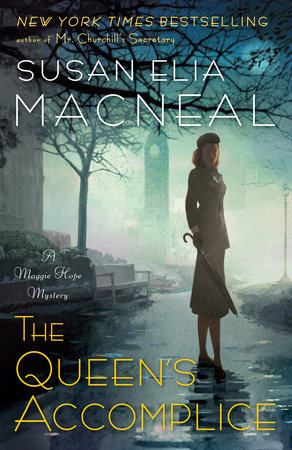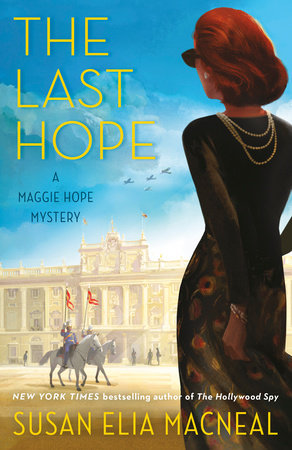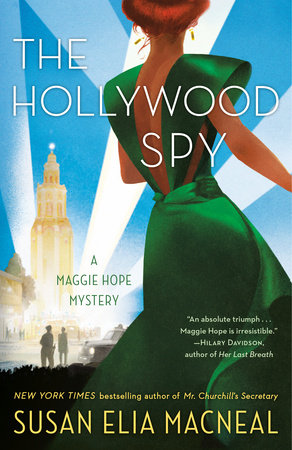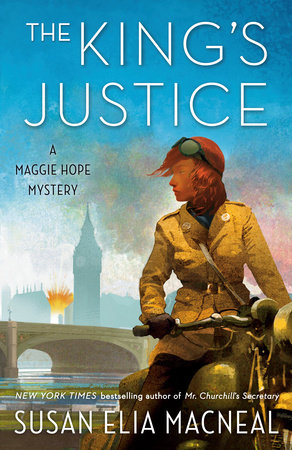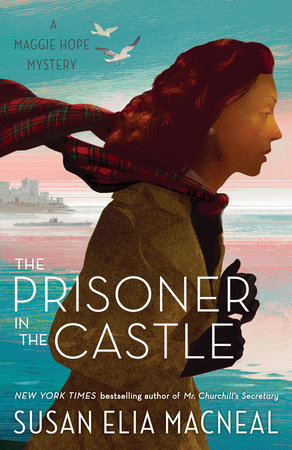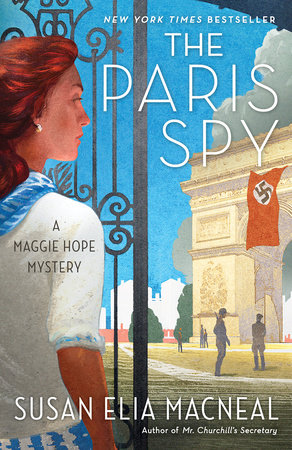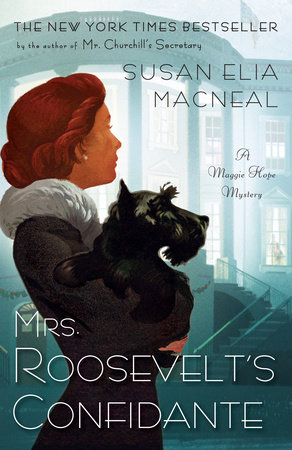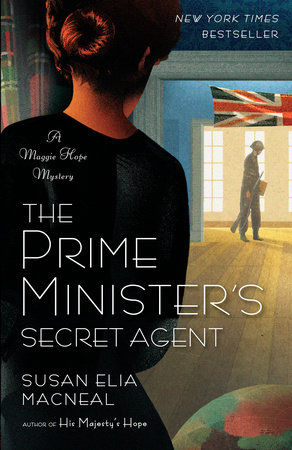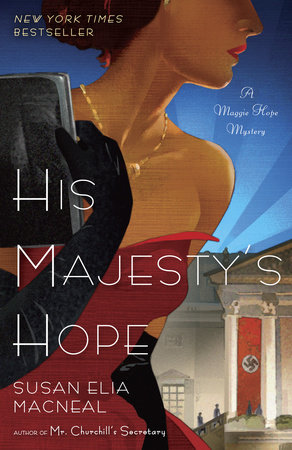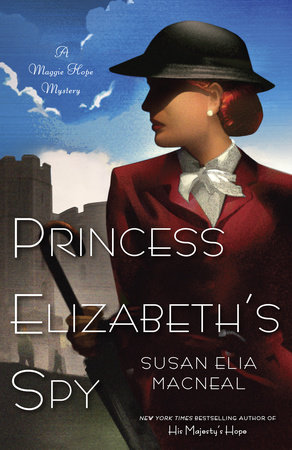Excerpt
The Queen's Accomplice
Chapter One
Something was wrong. Maggie Hope was sure, but she couldn’t yet put her finger on it. What could it be? Frowning, she went over the encoded document yet again.
Maggie was working as a girl Friday in a dim reception room at 64 Baker Street, at the Special Operations Executive’s offices. It was in an anonymous gray limestone building down the street from Sherlock Holmes’s fictional address and Regent’s Park, only one of the many unremarkable SOE offices scattered around the Marylebone area of central London. Because of lack of space in Whitehall, Baker Street and its surrounding area had become home for SOE, and several buildings had been fitted with discreet plaques reading inter-services research bureau. The staff and those in the know called it the Firm, the Org, or the Racket, and its employees were known as the Baker Street Irregulars, in honor of Holmes’s young informants.
The atmosphere in the shabby third-floor offices of 64 Baker Street was informal, with almost everyone sipping mugs of hot tea and smoking Gauloises, men and women passing through speaking perfect French. The icy reception room was small and narrow, with only one window and a low ceiling. A fire extinguisher and a notice pointing out the direction of the air-raid shelter decorated one wall, while a tacked-up postcard of the Arc de Triomphe covered the cracks of another.
Maggie wore an old skirt, a white blouse, and a thick navy-blue wool cardigan patched at the elbows. She was never without her pearl stud earrings, a graduation gift from her Aunt Edith, and her long coppery hair was up in a bun that had begun the day tidy but was now slipping, tendrils springing free around her face and neck. She sat at a dented metal desk with a Remington typewriter, behind a line of telephones in assorted colors, and an overflowing wooden inbox.
Only twenty-seven, Maggie had already performed any number of missions as an agent for SOE, but had taken a desk job in London while she was waiting for the arrival of her German half sister, Elise Hess, a Resistance worker in Berlin. Her rescue to London, ordered by Prime Minister Winston Churchill himself, was taking longer than expected—but Maggie knew all too well these missions never went exactly as planned.
And so she waited, and while she did, she made herself useful at the SOE offices. When she wasn’t greeting prospective agents arriving for their various interviews, she was checking coded messages transmitted by F-Section agents. After all, she’d been secretary to the P.M. himself—as well as saving the life of the Princess Elizabeth, parachuting into Nazi Berlin, teaching at a paramilitary camp, and keeping the First Lady of the United States of America safe from scandal. How hard could managing an office be? And it was only temporary, until her half sister arrived in London and settled in.
On this Saturday afternoon, as the light from the grimy window began to fade, Maggie was performing a task known as “code check,” going over an agent’s transmission from the field, making sure all was in order. Maggie—a mathematics prodigy who’d graduated summa cum laude from Wellesley College, with a special aptitude for codes and ciphers—liked to try her hand at transposing the worst of the garbled messages. As she worked, she rubbed absently at an ink stain on her blouse’s cuff and then buttoned up her sweater against the office’s chill.
Maggie knew the Morse coding systems intimately, knew how to “unscramble the indecipherable.” What looked to be problems in a given message might occur simply because an agent had transposed two letters, or misspelled a word. Each agent had a characteristic set of mistakes, and Maggie had quickly come to learn each one’s unique style of communication. For example, some agents routinely misspelled certain words—bad habits from childhood. Then there were the trademark sign-offs; a few liked to end with a simple Goodbye, while others sent Lots of Love, and yet another’s was Tallyho!
Maggie was worried about this particular message, from agent Erica Calvert, a young geologist who’d made a midnight boat landing on the beach near Normandy a few weeks before. Something was . . . not right. Calvert had studied earth science at St. Hilda’s at Oxford and was considered an expert on sand grains. But this particular message from her—well, Maggie had never seen anything like it. It was what they called “mutilated,” which might have been caused by atmospheric conditions. But Erica’s writing was also uncharacteristically clipped.
Most troubling was that Calvert hadn’t included her secret security check, carried by each agent, which gave SOE contacts back in Britain absolute confirmation the wireless operator was transmitting freely. Before leaving for a mission, each agent was assigned both a bluff check and a true check, which he or she had to insert into every message. These took the form of spelling mistakes or secret signals, agreed on with SOE, to show the sender had been captured.
All right, stay calm, Maggie thought as fear prickled up her spine. Let’s look at this logically. She could see four explanations for the oddities of Erica Calvert’s message.
One: The message had been transmitted by someone else in Erica’s network, but on Calvert’s set—and had left off the security code.
Two: Calvert was on the run and operating in difficult circumstances, which changed her fist, and she didn’t have time for the security code.
Then, three: Calvert had been captured. She was operating under German control and so had deliberately omitted the security code to alert SOE she’d been compromised.
And there was four—the worst-case scenario: Calvert was dead and the Germans were using her radio and codes with impunity.
When Maggie went to the overflowing file cabinet and looked up Calvert’s former messages, she found not only that Calvert had sent more than a dozen near-perfect ones since arriving in France, but also that she’d never forgotten her security check before. Not once. Damn, Maggie swore. What’s going on over there, Agent Calvert? Tout va bien?
There was the click of heels on the scratched parquet floor, and then a woman’s sweet, breathy voice inflected with a Welsh accent. “Excuse me? Miss Hope?”
Maggie slipped Calvert’s message into a manila folder, then looked up, into the eyes of a petite, curly-haired brunette named Bronwyn Parry, kitted out in an ATS uniform. A gap between her two front teeth and a sprinkling of freckles across her nose only added to her charm. Bronwyn had been one of Maggie’s best students at the SOE paramilitary training camp, near the town of Arisaig on the western coast of Scotland; she’d excelled at jujitsu, Fairbairn-Sykes knife fighting, and detonating explosives. Maggie had always liked Brynn.
“Just Maggie is fine now. How did the interview go?” Bronwyn had finished interviewing with Miss Lynd, one of the final hurdles before being sent to Beaulieu, the “Finishing School” for all SOE agents.
“It went well,” the young woman replied in her broad Cardiff accent, “but I don’t have a place to stay in London.” Her usually open face was troubled. “All these posh girls can book a room at Claridge’s or stay at Daddy’s pied-à-terre.” She rolled her eyes. “Meanwhile, the rest of us have to scrum for a place. . . .”
Maggie nodded. She knew firsthand how SOE was a curious cross section of social class and privilege.
Brynn shrugged. “And Miss Lynd insists I come in again tomorrow—for yet another interview.”
“I wish I could help you, Brynn,” Maggie offered with sincerity. “I’d ask you to stay with me, but my own flat was smashed in a raid—I’m bunking with friends myself.”
Brynn opened her handbag and pulled out a Woodbine cigarette and enamel lighter. She stuck the cigarette between her lips, lit it, and inhaled. “What should I do, sleep on a bench in Regent’s Park?” She puffed out a series of blue smoke rings.
“Well, that option might prove a bit nippy. Alas, SOE doesn’t provide temporary lodging—but here’s a place to try.” Maggie rummaged through the left-hand desk drawer, through an old bottle of clear nail polish for stocking runs, two rationed sugar cubes saved in an envelope, and a battered box of paper clips, until she found a business card: THE CASTLE HOTEL FOR WOMEN: Temporary Lodging for Ladies and the address in heavy black ink.
She handed it to Brynn. “You can call from here to see if there are any vacancies for tonight. Miss Lynd tells me a number of SOE interviewees have stayed there. Here, use this phone,” she said, pushing a green one toward the Welsh girl.
As Brynn came around the desk, they both heard a bellow. “Meggie!” a gruff male voice boomed from behind a thick wooden office door. “Meggie!”
Maggie sighed, then picked up Calvert’s file and rose. She walked the strip of threadbare carpet through the dim passageway, then pushed at the half-closed office door.
“It’s Maggie, sir,” she reminded him gently. Although the men in the office were referred to by their rank and wore uniforms, the women were called by their first names and expected to dress in civilian clothes.
Colonel Harry Gaskell was in his late forties, a short, rotund man with yellow hair and a fleshy, shining face. The beginnings of rosacea pinked his nose and cheeks. Although he’d served in the British Army’s Intelligence Corps as a doctor at the outbreak of the war, he’d been evacuated from Dunkirk and stayed in Britain. What concerned Maggie most was he had no firsthand knowledge of, or training in, guerrilla warfare, despite the fact he was in charge of F-Section.
Gaskell blinked pale eyes. “Meeting’s at five-thirty. We’ll jolly well need tea, and some of those oatmeal biscuits Miss Cooper made—hard as rocks, but if you dunk them, they’re not so bad.”
“Colonel—” Maggie began, handing him Erica Calvert’s file. Gaskell accepted it with a brisk movement, then flicked his eyes over the document and Maggie’s notes. He handed it back to her. “Jolly good job, young lady.”
“No,” Maggie persisted, “I believe something’s wrong, sir.”
“There’s only one explanation for Miss Calvert’s mistakes—carelessness,” the Colonel admonished. “The next time the girl’s schedule comes up, tell her she’s forgotten her security check. And remind her to be more vigilant!” He chortled. “Give that girl a rap on the knuckles!”
Maggie braced her shoulders. “Colonel Gaskell, Erica Calvert didn’t only forget the security check. Her fist was also out of character—unusually hesitant, not her style at all. I don’t like to be negative, but I believe it’s possible she’s been captured and her radio’s now in the hands of the Germans.”
Outside the window, she could see cars passing on Baker Street dusted by a light snow shower. The side of one red-brick building was painted with the advertisement take bovril to resist flu. There was the screech of brakes, a loud crash, and then a torrent of swearing as one car hit another on the slippery pavement.
“Fiddlesticks, Meggie! Er, Maggie. When you hear hooves, think horses, not unicorns! You’re doing jolly good work here and I know you’re concerned about the agents in the field, my dear, but let’s not let drama override duty, yes?”
As she turned and stalked away, Gaskell called after her: “And don’t let the tea steep too long this time!” Maggie could easily make out his grumbled complaint, “Damn Yanks . . .”
Gritting her teeth, Maggie put the file back in her desk drawer, then braved the frigid corridor to the dingy kitchenette to put the kettle on.


